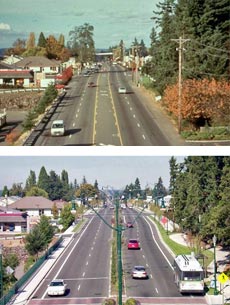Another reason for your employer to consider telecommuting: Being in a traffic jam can triple a person’s chance of having a heart attack
(Source: Streetsblog)
Automobile congestion is too often portrayed as mere nuisance or inconvenience. A new study from Germany, which we heard about via Streetsblog Network member blog The Hard Drive, reminds us that it is much more than that. The study, presented at the American Heart Association’s 49th Annual Conference on Cardiovascular Disease Epidemiology and Prevention last week, shows that being in a traffic jam — whether in a car, on a bike, or on a bus — can triple a person’s chance of having a heart attack:
“Overall, time spent in any mode of transportation in traffic was associated with a 3.2 times higher risk than time spent away from this trigger,” the study says.The researchers didn’t try to pinpoint the reasons for the increased risks, but stress is a suspect. Another one: the exhaust and air pollution coming from other cars, the authors said.Past studies have discovered that pollution from car exhausts causes arteries to stiffen, resulting in higher blood pressure and reduced blood flow to the heart.
Women, the researchers found, seem to be particularly at risk. Click here to read the entire article.




 Spain’s fourth largest city is getting 75 public electric vehicle recharging stations throughout the city this year. Spain’s ambitious program of introducing EVs, hybrid and plug-in cars (a million units for 2012) is promoting the new network under the Movele program. Seville is getting recharging stations in the most used parking lots in the city, as well as at the airport, city hall offices and other official buildings. The plan includes 500 electric cars, which will be allocated not only to public institutions but for private users as well. It’s expected that each simple recharging post will cost €1,000.
Spain’s fourth largest city is getting 75 public electric vehicle recharging stations throughout the city this year. Spain’s ambitious program of introducing EVs, hybrid and plug-in cars (a million units for 2012) is promoting the new network under the Movele program. Seville is getting recharging stations in the most used parking lots in the city, as well as at the airport, city hall offices and other official buildings. The plan includes 500 electric cars, which will be allocated not only to public institutions but for private users as well. It’s expected that each simple recharging post will cost €1,000. 



